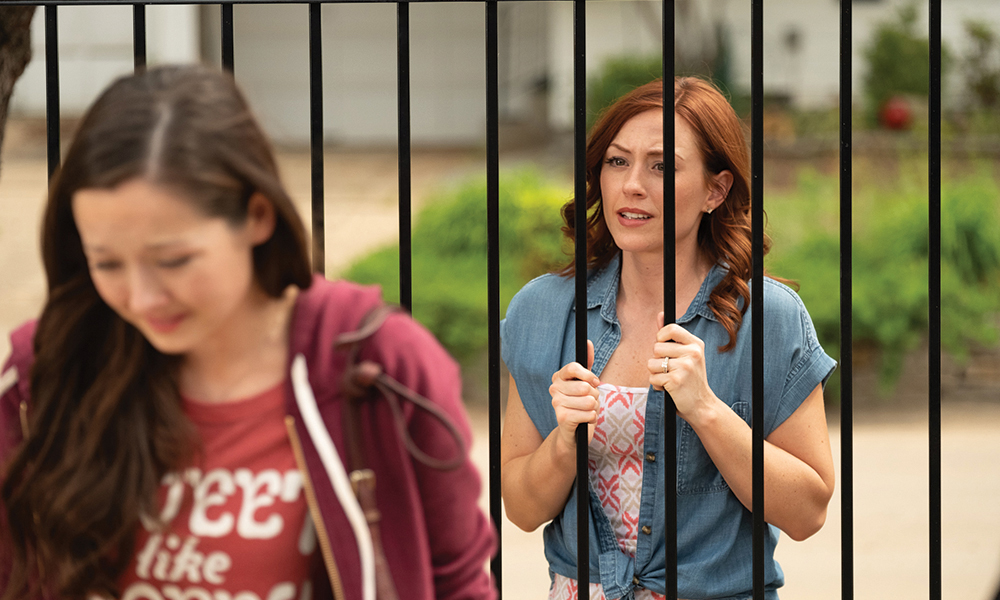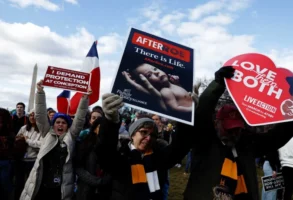
Published March 29, 2019
In her book “The Second Sex,” feminist French philosopher Simone de Beauvoir wrote about women who’d had abortions: “The one thing they are sure of is this rifled and bleeding womb, these shreds of crimson life, this child that is not there … for many women the world will never be the same.” Although a supporter of legal abortion (she had one herself), she was simultaneously well aware of the toll it took on both mother and child and didn’t mince words when describing it.
I generally try to avoid violence, especially if it involves harm toward children. I haven’t seen a scary movie, even a parody one, in years. I find that the images tend to get lodged in my head and replay themselves. I’d rather fill my mind with a good book.
I do, however, make exceptions. I saw “Schindler’s List” and “Saving Private Ryan” (clutching my husband’s hand about half the time). I am a strong believer in the power of a true story and of historical accuracy. There is a difference between stories that portray violence in service to the truth and that rely on that truth to tell their stories accurately, and those that use violence gratuitously. If done with the right motives, we can all gain something from sitting through moments, or even extend periods, of discomfort at the movies.
So that’s why I am broadly recommending that Catholics — and all those of goodwill — take the time to see the R-rated movie “Unplanned” when it opens broadly in theaters on March 29.
An accurate portrayal
“Unplanned” tells the true story of Abby Johnson, former Planned Parenthood abortion clinic director and one-time “employee of the year.” Johnson was firmly committed to her work as the clinic director until she was asked to assist at an ultrasound-guided abortion procedure on a 13-week old unborn child. Johnson — although in charge of the abortions at the clinic she managed — was not involved in supervising them directly. But the doctor she had booked that day for her clinic did only “ultrasound guided” surgical procedures in order to visually ensure he removed all the parts of the fetus and to most accurately determine the child’s gestational age. He needed an extra person in the room that morning, and Johnson was asked to step in.
As she held the ultrasound probe over her patient, Johnson saw the unborn child attempt to move away from the suction catheter, then witnessed its subsequent dismemberment and death. She was so traumatized by the experience that she resigned her position at Planned Parenthood days later.
“Unplanned” has been given an R rating by the Motion Picture Association of America. The MPAA bestows an R on movies deemed to contain material so disturbing that those under the age of 17 need to be accompanied by a parent or adult guardian. (As the mother of two teenage girls, the irony is not lost on me that both of my daughters could legally obtain an abortion in many of the states in which “Unplanned” will be shown, without me even knowing, yet they couldn’t see this movie without me or my husband present because it accurately depicts an abortion procedure.)
The only scenes in the movie that could have triggered the MPAA’s rating are those in which Johnson is asked to guide the ultrasound probe during a procedure, and her recounting of her memories of the second of her two abortions, a chemically induced one at eight-weeks’ gestation. There’s absolutely nothing else in the film that portrays violence or contains offensive language, nudity or vulgarity.
And yes, the scenes of two abortions — both the one that Johnson witnessed as clinic assistant and her own chemically induced termination — are graphic. But they are also medically accurate. The technical adviser to the film was Dr. Anthony Levatino, a board-certified OB/GYN and former abortion provider (who also holds a law degree). Levatino performed more than 1,200 abortions, including later-term second trimester procedures. He has a cameo role in the film as one of the Planned Parenthood clinic’s rotating abortionists.
An ER/trauma nurse who pre-screened the film noted afterward that “Unplanned” did a “stellar job of making all the health/clinic details accurate. So many medical shows are picked apart by real health care workers because they don’t have the right equipment, or it’s not realistic. But this film was completely accurate.”
Message of hope
It’s a good thing that “Unplanned” exposes abortion for the violence that it is; it’s part of the reason I recommend it. But the real reason to see the film is its message of hope, its emphasis on God’s endless desire to forgive our sins, and the idea that love and friendship do far more to change the culture than condemnation or anger. Johnson’s conversion began long before she witnessed the ultrasound images that led her to resign. Years before, peaceful pro-life sidewalk counselors from 40 Days for Life stood, week after week, to give peaceful witness and to offer alternatives to women going to Johnson’s Planned Parenthood clinic. They prayed for Johnson, offered her genuine friendship and, when the moment came that she ran out of the clinic after assisting at the ultrasound procedure, it was to them she went to ask for help.
During Lent, we are asked to rend our hearts, to renew ourselves and to leave our “old selves” behind. There is no better current movie than “Unplanned” that sums up this message. Abby Johnson’s courage in revealing her own abortions, her willingness to accept responsibility for more than 20,000 abortions done in the clinic she managed and her openness to God’s mercy and forgiveness provide lessons to us all.
Go and see it, but it’s best to skip the popcorn. It’s not that kind of movie.
Mary FioRito is an attorney and the Cardinal Francis George Fellow at the Ethics and Public Policy Center.











